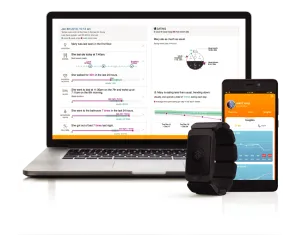Welcome to the first edition of the Agetech News Roundup, a monthly recap of the latest happenings in the world of technology for older adults. Below you'll find summaries of the latest Agetech financings, product announcements, and events. My name is Max Zamkow and I'm a coordinator for Aging2.0 New York and a partner at Third Act Ventures, a venture firm that invests specifically in startups working to make life better for older adults and their caregivers.
I signed you up to receive this newsletter because you're in the field, you mentioned to me that you're interested, or because you're one of my unlucky friends to whom I subject all my work. If you'd rather not receive any more of these, scroll to the bottom and hit the unsubscribe button.
Additionally, if you have a product announcement, funding update, or comment for future editions you can reach me here.
Enjoy!
CarePredict raises $9.5mm Series A & Launches CarePredict at Home
CarePredict, a startup that’s made inroads into senior facilities with its smart wearables tied to actionable insights, has almost doubled its total funding with this latest inside round. Its flagship product, Tempo, uses a variety of sensors and algorithms to detect what the company calls “activities of daily living” - everything from eating and drinking to bathing and using the toilet. After learning the user's habits, the system is able to detect abnormal behavior and alert the appropriate caregiver in real time.
Originally only for those in Senior Living facilities, at CES CarePredict launched a direct-to-consumer product. According to the release, the company is promising to “empower family members with constant visibility and unparalleled insights [...] allowing them to make the right decisions well in advance”. Promising this Orwellian fantasy has been the downfall of companies past - after all, who likes being monitored constantly. We’ll see if CarePredict can succeed where others have failed.
SameDay Security raises $32mm to create a “Virtual” caregiver
SameDay Security, the maker of Electronic Caregiver, a minor player in the PERS market, raised $32mm on the promise of Addison, a virtual caregiver they debuted at CES. According to the press release, she's a “state of the art, 3D animated caregiver” who can carry on two-way conversations, ensure medication adherence, and provide real-time assessments to a care team. Intended as an aid for Home Care agencies, the company hopes to reach the millions unable, or unwilling, to spend the thousands required for 24/7 care.
ElliQ partners with Toyota & now available for pre-order
Speaking of non-human caregiving, after 4 years and $22mm in funding, Intuition Robotics’ ElliQ is finally available to pre-order, expecting to ship this summer for the not-so-low price of $1500. The company also announced at CES the launch of “Platform Q”, described as “a cognitive AI platform that brings third-party devices to life”. Essentially this means that Intuition Robotics is throwing its hat into the ring to compete with Siri, Alexa, Cortana, and Google for voice assistant dominance. Speaking about its partnership with Toyota, an investor in Intuition Robotics, the company says that it’s creating an experience in which the car engages driver and passengers in a proactive, personalized and delightful way as a key to accelerate consumer acceptance of autonomy. As exciting as that sounds, a startup splitting its focus before it begins selling its first product is rarely a good sign. Good luck ElliQ, here’s hoping you don’t end up like Jibo or Kuri.
Foray launches a crowdfunding campaign for its modern rollator
Foray’s “Spring”, its much anticipated modern take on the rollator (aka walker with wheels) has launched on Indiegogo. Founded in 2015, Foray was one of the first companies to see an opportunity in more modernized, good looking accessibility devices. Other companies have followed suit, such as Lonjev which received funding last year to start manufacturing its line of shower chairs. The Spring hit its goal in the first 48 hours of going live, a huge testament to all the hard work the Foray team has put in.
The $5bn hearing aid industry is beginning to crumble
Since their invention over 100 years ago electronic hearing aids have had three things in common: they’re incredibly expensive, they don’t work very well, and they’re so ugly that many would rather be deaf than wear them. In the last few years a few startups have attempted to disrupt parts of the problem - Audicus cut out the middle-men markups with a Casperesque direct-to-consumer offering, while the now-deceased Doppler Labs tried to make them look cool.
But just like everything in life, timing is everything. Thanks to technological advances and a regulatory change in which prescriptions are no longer required, we’re seeing a proliferation of low-cost, high-tech hearing aids hit the market. Nuheara is picking up the torch from Doppler Labs, making good-looking devices with such great performance that last year they became the first non-traditional hearing aid to be prescribed by the UK’s National Health Service. Oticon is maintaining a relatively high price but packing their new Opn devices with features like Bluetooth connectivity, tv adaptors, and an AI assistant. ZVOX meanwhile has taken its voice boosting speaker technology and is embedding it in $249 hearing aids, a fraction of the cost of traditional devices. Expect to see a lot of turmoil in this industry as new players continue to enter and incumbents struggle to innovate.


Join the conversation